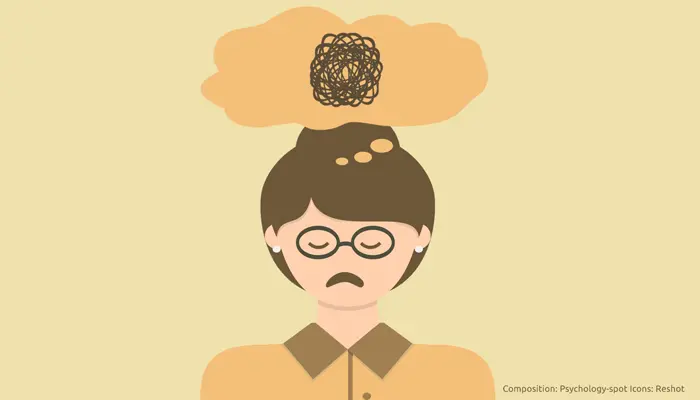
Uncertainty. Fear. Incomprehension. These are the three sensations that mostly affect those who suffer from anxiety but do not yet have a definitive diagnosis.
Unlike physical illnesses, it is not always easy to explain how anxiety feels like, a disorder where physical, emotional and cognitive symptoms converge and can become a real ordeal. In fact, for many people the diagnosis becomes even liberating because they finally find an explanation for what happens to them and, of course, they can find a solution.
Anxiety is not a monolithic entity, which means that it can present itself in different ways. There will be those who suffer more from its psychological effects and there will be those who somatize it. In any case, knowing your first symptoms will help you to detect it quickly and stop its progress.
Symptoms of anxiety that usually go unnoticed
1. Cold feet. Yes, cold feet are not only uncomfortable, they can also be a symptom of anxiety. When you are anxious, your brain assumes that you are in danger and, therefore, redirects the blood flow to the most important organs of the body that are in your torso. As a result, less blood reaches the extremities. This ancestral fight or flight response is designed to guarantee your survival. Unfortunately, that mechanism is activated indistinctly, whether you are in real danger, as with a brown bear ready to attack you, or if you feel anxious because you are going to be late for the meeting.
2. Frequent yawning. Yawns are not only an indicator of sleep or boredom, they can also become a sign of anxiety. In fact, in recent years has taken shape a theory according to which, yawns serve to expand and contract the walls of the maxillary sinus in order to pump air to the brain and lower its temperature. It has also been appreciated that nervous people and those who suffer from generalized anxiety or panic attacks, tend to yawn more. In fact, a research at Bournemouth University revealed a connection between the frequency of yawns and the increase in cortisol, the stress hormone, in the blood. The curious thing is that cortisol also increases body and brain temperature. And that is the reason that would make you yawn more when you feel anxious.
3. Recurring nightmares. If you have nightmares that repeat frequently, it is likely to be an expression of anxiety, frustration and/or worries. That was the conclusion reached by a group of psychologists at the University of Cardiff, who explain that occasional nightmares are an attempt to make sense of daytime experiences, but recurring nightmares are the result of negative emotions derived from a deep sense of lack of control over our lives and the idea that we are unable to deal with problems.
4. Brain fog. If you are having a hard time concentrating lately, it may be due to anxiety. It’s not just that constant worries prevent you from focusing your attention because your mind is in a whirlwind of ideas, but you can experience a kind of “brain fog”, also known as fiber fog. You can perceive it as an inability to grasp reality and think clearly. As a result, you are likely to start having memory problems. It will be hard for you to remember even what you just read.
5. Metallic taste in the mouth. Anxiety usually produces a metallic taste in the mouth, which can be quite unpleasant. There are different explanations. The most likely is that stress is causing a reaction of the bacteria inside the mouth that makes your gums bleed. The blood has a metallic taste, and that’s what you notice, although the amount is so small that you can’t see it. In addition to this, during the periods of anxiety you become more sensitive to certain flavors. In fact, an experiment conducted at the University of Bristol proved that anxiety enhances the perception of bitter and salty flavors.
Face anxiety before it defeats you
Is it important to seek help as soon as possible if you suffer from anxiety? Absolutely. Different studies have shown that the sooner help is requested, the faster anxiety can be overcome and, above all, the more lasting those results will be over time.
The sooner the vicious circle that generates anxiety is broken, the better is. By the passage of time, your brain will memorize the anxious response, so it will be more difficult to break that pattern.
Can anxiety become resistant? Of course! A study conducted at UCLA revealed that approximately 60% of patients do not respond well to conventional treatment of anxiety, and continue to have bothersome symptoms that affect their quality of life. These people develop what is known as resistant anxiety, which is due, among other factors, to have waited too long before seeking help.
Do you want to eliminate the root of anxiety? This book about anxiety will not only allow you to understand its mechanisms, but also to take advantage of practical techniques that will help you relax and stop anxiety once and for all.
Sources:
Campbell, R. &Vansteenkiste, M. (2018) Linking psychological need experiences to daily and recurring dreams. Motivation and Emotion;42(1): 50-63.
Simon, B. N. et. Al. (2012) Born to Yawn? Understanding Yawning as a Warning of the Rise in Cortisol Levels: Randomized Trial. Interact J Med Res; 1(2): e4.
Heth, T. P. et. Al. (2006) Human Taste Thresholds Are Modulated by Serotonin and Noradrenaline. Journal of Neuroscience; 26 (49): 12664-12671.
Bystritsky, A. et. Al. (2006) Treatment-resistant anxiety disorders. Mol Psychiatry; 11(9): 805-814.
Dadds, M. R. et. Al. (1997) Prevention and early intervention for anxiety disorders: a controlled trial. J Consult ClinPsychol; 65(4): 627-635.



